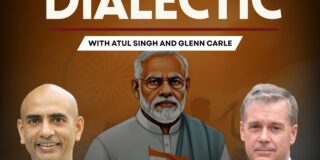Zulfikar Ali Bhutto was a Pakistani politician who was the fourth president of Pakistan from 1971 to 1973 and the ninth prime minister of Pakistan from 1973 to 1977. During his time as a legislator, he founded the Pakistan People’s Party (PPP), a social-democratic political party in Pakistan, promoting social democracy, equality, and social justice, along with maintaining a strong military. Bhutto also declared Ahmedi non-Muslims, allowed feudal lords into the political system, and destroyed bureaucracy and state ventures. Two opposing narratives surround Bhutto’s reputation as a leader on this episode of FO° Podcasts. One narrative sees him as a great hero of Pakistan who was unfairly killed by a murderous military dictator. The other paints him as a villain who destroyed the economy and established a corrupt dynasty that is still looting Pakistan. Nasir Khilji takes a step back, takes a deep breath and examines Bhutto’s legacy.
Bhutto’s opportunistic rise to power
Bhutto entered politics under President Iskandar Ali Mirza as a cabinet member in 1955. In 1958, President Muhammad Ayub Khan, the first military dictator of Pakistan, appointed Bhutto commerce minister and he went on to hold other cabinet posts. In 1963, Bhutto was appointed foreign minister and became a proponent of Operation Gibraltar. This was Pakistan’s military strategy to incite insurgency among the Muslim-majority population in the Kashmir Valley. Bhutto advised Ayub Khan to infiltrate Kashmir, assuring him Pakistan would walk away victorious. However, as a result of poor planning and execution, the infiltrators’ presence was quickly discovered by the Indian military, resulting in their defeat.
In early 1966, India and Pakistan signed the Tashkent Declaration to resolve the Indo-Pakistan War of 1965. Bhutto negotiated this treaty but, soon afterwards, claimed that the peace treaty to which Bhutto himself was a party was signed unilaterally by Ayub Khan. To be precise, Bhutto backstabbed Ayub Khan.
This populist politician dishonestly argued that Pakistan was denied a victory thanks to Ayub Khan’s deal with India and started a movement against his boss. Bhutto resigned as foreign minister and launched the PPP on an Islamic socialist platform. Bhutto caused the downfall of Ayub Khan and another military general named Agha Muhammad Yahya Khan took charge in 1969.
Yahya Khan announced an election in 1970. Bhutto’s PPP won in West Pakistan, the modern-day Pakistan. The Bangladesh Awami League led by Sheikh Mujibur Rahman triumphed in East Pakistan, modern-day Bangladesh. After 1947, Pakistan comprised both West and East Pakistan, both of them separated by around 2,000 kilometers with India in between. West Pakistan tended to dominate and imposed Urdu on its eastern cousins. In 1970, Mujibur Rahman won the overall majority but this caused unease among the West Pakistan elites.
Many in West Pakistan, including Yahya Khan and Bhutto saw Awami League’s Six Point Movement as an attempt to divide the country. Bhutto refused to accept an Awami League government and charmingly threatened to “break the legs” of any elected PPP member who dared to attend the inaugural session of the National Assembly, Pakistan’s parliament. Bhutto’s intransigence created a political and constitutional crisis.
The military annulled the elections. Mujibur Rahman called Bengalis to join him in the struggle for Bangladesh. He was jailed but a full-blown struggle for independence erupted. The Pakistani Army committed awful human rights abuses, including indiscriminate killings, torture and mass rape. Refugees fled across the border and India intervened on behalf of Bangladesh. The Indo-Pakistan War of 1971 led to catastrophic defeat for the Pakistani Army and the liberation of Bangladesh. Yahya Khan stepped down and Bhutto took over.
Bhutto’s achievements and failings as Pakistan’s leader
Bhutto rescued the 93,000 West Pakistani troops that became prisoners of war in India after signing the Shimla Agreement, a peace treaty signed between Pakistan and India in 1972. The agreement put an end to the India-Pakistan conflict and the diplomatic recognition of Bangladesh by Pakistan. On the whole, this agreement turned out to be very favorable for Pakistan because Bhutto won great gains on empty promises to India. After the Shimla Agreement, Bhutto became a savior for retrieving thousands of Pakistani troops and wresting diplomatic victory from the jaws of military defeat. This was the high watermark of his leadership.
While Bhutto deserves praise for his deft diplomacy during the Shimla Agreement, his economic policies are more controversial. Bhutto lurched to the left in his economic policies. After all, he had promised his people Islamic socialism and proceeded to implement a policy of widespread nationalization. The Pakistani government took over key industries, banks and private enterprises.
Like other left-leaning policies, Bhutto’s socialism intended to reduce economic disparities and promote public ownership. However, it led to inefficiency, reduced productivity and a decline in private sector investment. Bhutto’s socialism gave too much power to the Pakistan Administrative Service (PAS), leading to red tape, inefficiency, corruption, increasing transaction costs, and crushing businesses.
Bhutto’s critics not only blame him for the military defeats of 1965 and 1971 but also brutal repression in Balochistan. Bhutto sacked two provincial governments within six months, arrested the chief ministers, two governors and 44 legislators. In 1973, he launched a military crackdown on Balochistan that caused thousands of deaths and led to massive human rights abuses. It was under his leadership that Pakistan’s parliament passed a law declaring Ahmadis to be non-Muslims in 1974.
Many blame Bhutto for this highly discriminatory sectarian law but others point out that it was the National Assembly that passed this legislation. Bhutto was just a politician who followed the mob instead of a leader who pointed to a promised land. Because of his reputation for loving wine, women and song, he banned alcohol for Muslims to appease the mullahs. They had been growing in power since independence in 1947 because Pakistan was a largely illiterate country. These mullahs were criticizing Bhutto and, once he gave in on alcohol, they pushed hard on the Ahmadi issue. Ironically, Ahmadis were some of the greatest votaries of Pakistan, great entrepreneurs and one of them was the father of the Pakistani atom bomb.
Even Bhutto’s critics give him credit for his foreign policy though. He promoted secular internationalism as well as bolstering relations with the Islamic world. Relations with both communist China and Wahhabi Saudi Arabia improved during Bhutto’s tenure. In 1973, his government drafted the current constitution of Pakistan, following which he appointed Fazal Ilahi Chaudhry as president and assumed the newly-empowered role of prime minister. Bhutto also initiated Pakistan’s nuclear weapons program, which ultimately led to his country developing an atom bomb.
To this day, Bhutto’s supporters defend him. Some even support his economic policies, claiming they increased social justice and reduced income inequality. Nasir Khilji points out that postcolonial states were going through a socialist zeitgeist. Bhutto’s Indian counterpart Indira Gandhi turned even more socialist than him. The Indian Administrative Service (IAS) became even more powerful than the PAS. So, Bhutto deserves a benefit of doubt for adopting socialism. After all, he was a lawyer, not an economist.
To this day, Bhutto’s legacy is a matter of contention. Supporters laud his nationalism, secular internationalist agenda and diplomatic achievement, especially the Shimla Agreement. They give him credit for the atom bomb and the constitution, and consider him one of Pakistan’s greatest leaders. In contrast, his critics condemn him for Pakistan’s economic ruin, catastrophic military defeats and terrible human rights abuses. Khilji believes he was more of a villain than a hero. In a nutshell, his legacy is a deeply tortured one for his country and his region.
[Madelyn Lambert wrote the first draft of this piece.]
The views expressed in this article/podcast are the author’s own and do not necessarily reflect Fair Observer’s editorial policy.















Comment